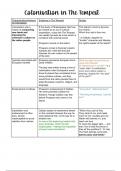Colonisation in The Tempest
Characteristics/Analysis Evidence in The Tempest Quotes
of Colonisation
colonization was a If the study of Shakespeare itself can This Island's mine by Sycorax
means of conquering be viewed as an act of cultural my mother,
new lands and imperialism, a play like The Tempest Which thou tak'st from me.
imposing the can readily be seen as a text which is
colonizer's culture on complicit with colonial power. - is Caliban, despite his
the native people. “brutish” character and lifestyle,
Prospero’s arrival on the island the rightful leader of the island?
Prospero comes to Sycorax's island,
subdues her, rules the land and
imposes his own culture on the people
of the land.
Typically associated with Prospero represents European force - What foul play had we that we
European traveller Duke of Milan came from thence?
Or blessèd was ’t we did? - is a
The play was written during a time of “clean slate” to established
colonization when Europeans would one’s own justice system a
travel to places they considered to be blessing, despite the “foul play”
more primitive cultures, and they of the past”?
would force the native people there to
adopt European customs, religion, and
language.
Enslavement of natives Prospero's enslavement of Caliban “lying slave” “abhorred slave”
He never promises Caliban his
freedom, though Caliban was free 'This thing of darkness, I call my
before Prospero ever came to his own''
island.
Imperialism and Caliban bases his resentment afresh “When thou cam'st first,
enslavement is often on the contrast between the way he Thou strok'st me, and made
slow, almost was treated at first, vs the way he is much of me: wouldst give me
imperceptible to avoid treated now: Water with berries in't, and
rebellion from natives he was at the beginning treated with teach me how
every kindness, which he then To name the bigger light,… and
reciprocated - making this imposition then I lov'd thee And show'd
of power seem beneficent. thee alI the qualities O ' th' Isle,
The fresh springs, brine-pits,
barren place and fertile.”
,Stereotype of “savage It is difficult to know exactly how
natives” - is Caliban Shakespeare sees Caliban. Stephano consistently refers to
inherently brutish or is • On the one hand Caliban attempted Caliban as “servant monster,”
his behaviour justified to rape Miranda, suggesting that his “man-monster,” and
due to his nature really is "brutish"; “mooncalf”.
circumstances? • on the other his legitimate claim
to the island makes Prospero “was not honored with a human
seem as much like a usurper as shape”
his brother, Antonio
“the son that she [Sycorax,
It is thought that Shakespeare Caliban’s mother] did litter
here”.
included the attempted rape as a
justification for Prospero's
A devil, a born devil, on
enslavement of Caliban—and thus, by
whose nature Nurture can
extension, the Europeans'
never stick:
enslavement of Africans and Native
Americans.
Caliban as an Shakespeare does not shrink from the According to Prospero, he is not
exaggeration of the “wild darkest European fantasies about the even human: a 'born devil', 'got
man” Wild Man; indeed he exaggerates by the devil himself lUpon thy
them: Caliban is deformed, lecherous, wicked dam'.
The character of Caliban evil-smelling, idle, treacherous, naive, - perhaps describes Sycorax as
dramatises otherness drunken, rebellious, violent and devil- a Devil for her abuse of power
and exoticism. worshipping. on the island… but doesn’t P
do the same thing? (hypocrisy)
, Prospero manipulates Ariel is an acquiescent slave to All hail, great master! Grave
Ariel and Caliban to feel Prospero - she carries out each of his sir, hail! I come
indebted to him for his commands without hesitation. Even To answer thy best pleasure, be
supposed “civilisation”, excitedly at times, “I flamed ’t to fly,
while also assuming amazement”, Ariel recalls about his To swim, to dive into the fire, to
control under the (futile?) spurring of the tempest. However, her ride
promise of freedom. obedience is grounded in a promise On the curled clouds. To thy
for freedom, rather than the will of a strong bidding, task
loyal subject. Ariel and all his quality.
Prospero does not explicitly promise “I will be correspondent to
Caliban freedom as he already command
believes Caliban has been “freed” And do my spiriting gently.”
from a “brutish”, uncivilised lifestyle.
Caliban vows to “be wise
hereafter And seek for grace.
Miranda remarks that Caliban was
What a thrice-double ass Was I,
“Deservedly confined into this rock,
to take this drunkard
Who hadst deserved more than a
[Stephano] for a god
prison.” Self-knowledge for Caliban,
however, is not empowering. It is only And worship this dull fool!”
a constant reminder of how he is
different from Miranda and Prospero
and how they have changed him from
what he was. Caliban’s only hope for
an identity separate from those who
have invaded his home is to use what
they have given him against them.
Ariel is indebted to Prospero - sense
of loyalty
Viewing natives in terms Caliban works for Prospero: fetching Trinculo speculates that Caliban
of their monetary value wood, tending the fire, and other would “make a man” in
“offices that profit” Caliban represents England, i.e. make Trinculo rich
both wealth, labor, and survival for by attracting people who would
Prospero and his daughter. be willing to pay to see him.
They are not interested in Caliban’s Antonio, Prospero’s brother,
qualities as a person or his potential states that Caliban is “very
autonomy, but view him as an object, marketable”
something they can profit off. This, of
course, mirrors colonial financial We cannot miss him: he does
concerns. make our fire,
Fetch our wood, and serve in
offices That profit us. -
Enslavement?





